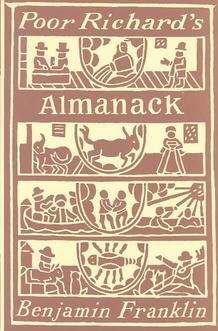 Technology advances in leaps and bounds with every passing year but I believe the fundamental principles of money and wealth haven't really changed one iota in centuries. Ever since I heard Benjamin Franklin's quote: "The way to wealth is as plain as the way to market. It depends chiefly on two words, industry and frugality: that is, waste neither time nor money, but make the best use of both. Without industry and frugality nothing will do, and with them everything." I have endeavoured to live by the principles of industry and frugality. It's not easy, in fact, it's an even greater challenge when you're surrounded by hoards of self-promoting (yet still lovable) Alpha males on a trading floor day in day out. Poor Richard's Almanack is a collection of aphorisms that Benjamin Franklin first published in 1732 and although the book talks about everything from health, love and marriage to business and money, I found his quotes on money and humility most engaging. There were some quotes I didn't get at all and his poetry was even harder to comprehend. That said, I think the bulk of the book, the portion with all the quotes was reasonably easy to read and I would recommend everyone to give it a go. From his writing, Benjamin Franklin saved whatever he could, he spoke only when necessary and he made the best use of his waking hours and I think it's no bad thing to work off the same model. My colleagues think I'm a complete miser and they associate my frugality with misery and being boring, they completely fail to comprehend that one can gain satisfaction from such things as a lone two hours in the park, writing. All their pleasures seem to have crazy nights out drinking absurd amounts of alcohol or spending money at their core - they complain and worry about it but are so deeply rooted in consuming that they do not see it as a problem. One of my colleagues expressed this phenomenon best when he stated his wish for a meter that showed how fast his net worth was falling the moment he hit hit High Street Ken every Saturday morning because it felt as though money just drained out of his pockets from the moment he left his flat! We debate this issue often and in my opinion, I am way happier than they are (yes, not doing too well on the humility stakes today). I am quite content with what I have but that is not to say I don't want more, (almost) everyone wants more, it's what makes us people but to simultaneously be content with your current lot, that is difficult. I have never been a big spender but there was a time when "getting my eagle on" up in the club was what I looked forward to but one day I woke up and I wasn't that girl anymore and Benjamin Franklin's quotes help me to realise that that is actually ok. He was a lot more abstemious than I will ever be but I will try to stick to my belief that no matter how much you have, one should aim not to be wasteful, firstly, because the earth's resources are limited and secondly, because a life of excess erodes the value out of the small pleasures of life. I think the second reason warrants a little explanation: one of my colleagues (the same one as above) told me he feels there is nothing special about a meal out because he eats at Michelin starred restaurants so often. I limit myself to two or three meals out a week, normally to ordinary restaurants and each occasion feels special to me even if it's just to Wagamama's because I love food and if I had it my way I would have a Michelin starred breakfast, lunch and dinner everyday of the week - but unlimited fun limits the pleasure - diminishing marginal utility to my fellow economists. This is the first Benjamin Franklin novel that I have ever read and on the back of it I hope to read more about his life.
0 Comments
Leave a Reply. |
By Heather Katsonga-WoodwardTime allowing, I love to read. If I read anything interesting, I will blog about it here. Categories
All
Archives
November 2015
|


 RSS Feed
RSS Feed






